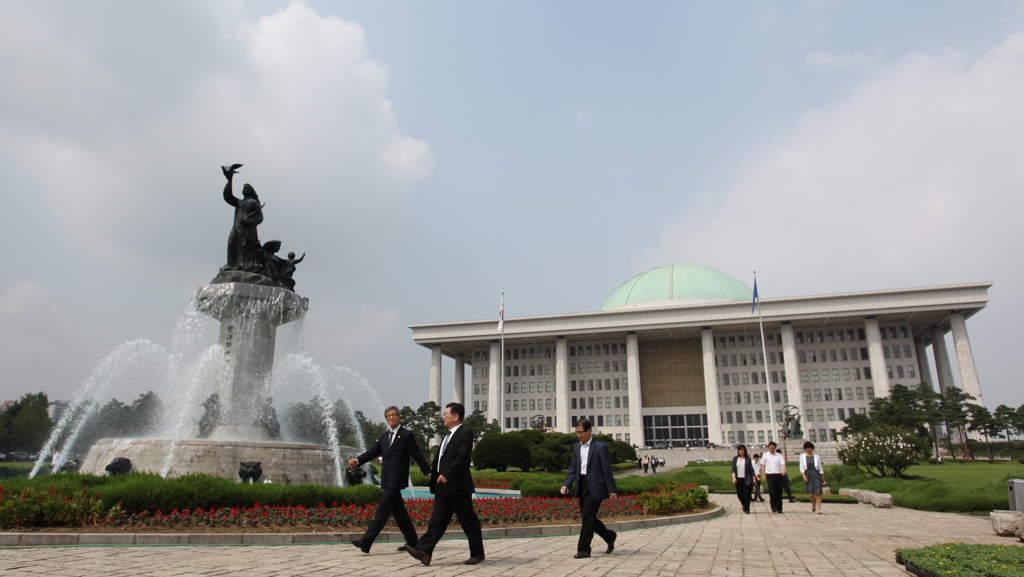The Peninsula
Defector in Their Midst: The First North Korean in the National Assembly

By Troy Stangarone
When members of the 19th National Assembly take their seats in Seoul a defector from North Korea will join them for the first time. As a candidate on the New Frontier Party’s proportional representation list, Cho Myung-chul became the first defector to win a seat in the National Assembly.
Cho defected to South Korea in 1994 and came from a relatively privileged background in North Korea. His father was a minister in the Ministry of Construction and Transportation, while his mother was a professor at the People’s Economic College. At the time of his defection, he was serving as an exchange professor at Nankai University in China and had received a Ph.D from Kim Il-sung University where he would later become a professor before his defection.
Since arriving in South Korea, he has been fairly successful at integrating into society. Before turning to elective politics he oversaw the Center for International Development Cooperation at the Korea Institute for International Economic Policy and became the first North Korean defector to work in a high level position at the Ministry of Unification where he served as chief of the Education Center, which develops curriculum for schools related to unification.
In an interview with CNN, Cho talks about how one of the reasons he chose to enter politics is to help policy makers shape better policy towards Pyongyang. When it comes to North Korea he points out that South Koreans “understand in an abstract sense that something is not right, but they don’t have actual knowledge of life there.”
While his election to the National Assembly as a proportional representative holds interesting questions regarding how he will be able to achieve his goal of bringing greater understanding to policy towards North Korea, it also represents a microcosm of the challenges that Korea will face when reunification occurs.
To date much of the discussion on reunification has focused on the financial aspects or how to slow the process down to avoid some of the difficulties Germany has faced. However, these are likely to be minor challenges when compared to the questions Korea will face when it comes to integrating North Koreans into South Korean society, including those in the former elite like Cho.
After sixty years of separation, the two societies have drifted apart in ways that will likely only truly become evident after reunification occurs. The most basic things in life from work to social norms in South Korea will be alien to many in the North and no amount of pirated DVD’s of South Korean movies will likely change that. Handling these challenges will raise a series of difficult issues beyond the hard choices that will have to be made in regards to handling members of the regime in North Korea.
For the average North Korean living in a society where the rule of law rather than the rule of force applies will be a challenge. Even though many North Koreans have been forced into markets for survival in the North, that does not mean that they will be prepared to live in a society where one is expected to work to support themselves in the manner that South Korea and many Western societies have developed.
Cho’s own experience in South Korea illustrates this. When describing his own transition to South Korean society in the same interview he said that “Living here [South Korea] I had to re-learn everything from the beginning. There was only one thing we had in common, the language and other than that, the gap was huge.”
Politically, there will be hard choices as well. Will people in the North be allowed to develop their own political party or will they be restricted to joining the existing political parties of the South? This question will befuddle many who will have come from a society where opposition parties are not allowed and Cho describes elections as event where North Koreans don’t have a choice but rather “have a little piece of paper and a pencil right next to it. If you don’t like the candidate you can pick up the pencil and cross the name off, but the person who picks up the pencil will die. There is always someone watching outside and of course there is only one candidate.”
While Cho’s achievement is an important step, the lack of experience with politics and multiple parties will be additional hurdles for South Korea in integrating citizens for the North. Just as being able to earn a living to support a family will be one of the key tests for the new integrated society, ensuring that North Koreans feel as though they have a true say and stake in the political system will be a key the long-term success of a united Korea.
Many Germans living in the East had prior experiences with democracy and living in a market based economy prior to the separation after World War II. North Koreans will share none of these institutional memories that likely helped to facilitate the reintegration of the people of the two German states.
While Cho’s election is likely an important first step on the road to successfully answering how to integrate the two societies, it also shows the potential difficulties that lie ahead as his achievements tend to be more the exception than the rule when it comes to the integration of defectors within South Korean society. The better Seoul is able to address that challenge before reunification the easier it will likely be to integrate the people of the North when the time comes.
Troy Stangarone is the Senior Director for Congressional Affairs and Trade for the Korea Economic Institute. The views expressed here are his own.
Photo from Jeroen Elfferich’s photo stream on flickr Creative Commons.
